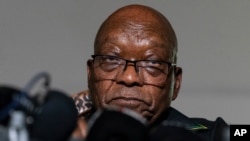A South African civil rights organization is preparing to ask a court to compel the country’s prisons chief to detail the process that was followed in granting medical parole to former President Jacob Zuma.
The 79-year-old Zuma was freed from prison to home detention last week after serving about two months of a 15-month sentence for contempt of court. This, after he refused to testify at an inquiry into corruption that happened when he led South Africa.
Zuma’s representatives say he’s terminally ill but have refused to explain the nature of his condition. The former leader was freed by Correctional Services Commissioner Arthur Fraser, who was appointed by Zuma to lead South Africa’s intelligence department.
Fraser acknowledges he didn’t follow the legal protocol of having an independent medical parole board assess Zuma before releasing him. He told South Africa's state broadcaster, however, that he was satisfied with reports issued by his team and Zuma's doctors.
“It was only around the third report that we received where his medical team, in conjunction with ours, indicated that he can no longer be kept in our facility because the type of medical care required cannot be provided there," he said, "And this assessment is made with every other offender that we have in our facilities.”
Ernst Roets, lawyer and policy head of Afrikaner rights group Afriforum, says it is impossible at this stage to verify Fraser’s statements since the department is keeping everything regarding Zuma secret.
“You can’t make the argument that we’re protecting Jacob Zuma’s personal constitutional rights, therefore we’re not disclosing any information," Roets says. "It’s not a violation of the prisoner’s rights if you publish the information according to the guidelines for release. But if you don’t do that, it’s a violation of the public’s rights.”
Zuma -- whose arrest in July sparked violent nationwide protests and looting --is due to stand trial soon on multiple counts of allegedly stealing millions of in public funds.
Roets says transparency is a necessity, especially with high-profile figures like Zuma.
"The first question we want to have an answer to is: Is former President Jacob Zuma terminally ill? If you’re in prison and you get sick, that doesn’t mean by implication that you get released on medical parole," he said. You have to be really extremely sick.”
Afriforum also wants to know why Fraser didn’t allow the medical parole advisory board to make recommendations about Zuma.
“We’re very concerned that the legal processes have not been followed. Former President Jacob Zuma was released obviously because of his political connections and standing," Fraser said. "This clearly sends an indication that in South Africa, your identity determines how you would be treated by the justice system.”
Some newspapers are reporting that President Cyril Ramaphosa authorized Zuma’s release. They quote government sources saying Ramaphosa didn’t want Zuma to die in jail, which the president feared would spark the kind of violence that followed Zuma’s incarceration.
Roets says “it’s bad news” if the president helped to free Zuma.
“There’s no point in saying, ‘We’re serious about corruption; we’re going to make sure we address this problem head-on,’" he said. "And then once someone refused to show up at the commission where corruption is investigated, and a court rules that this person should go to prison, then that person is only there for a few weeks before a decision that that person should be released,” he said.
Ramaphosa’s presidential office says he will respond to the reports at a later stage.
A court pushed the resumption of Zuma's corruption trial to September 21.





